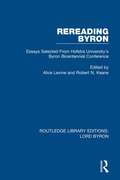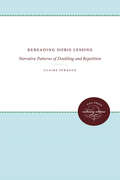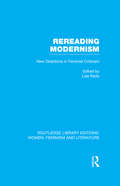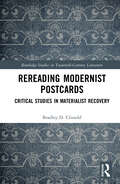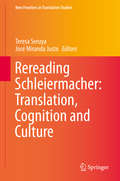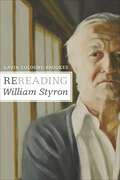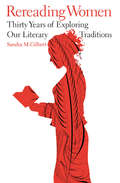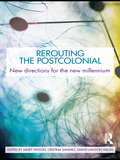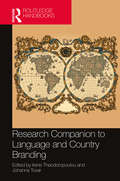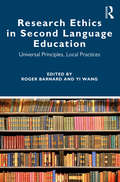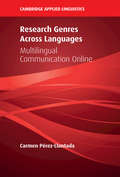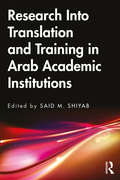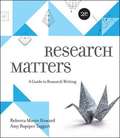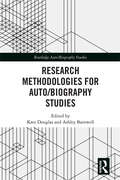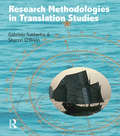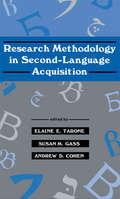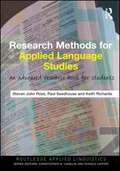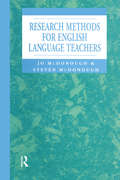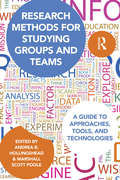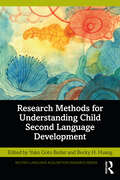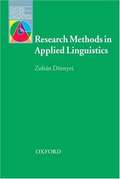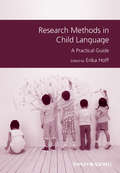- Table View
- List View
Rereading Byron: Essays Selected from Hofstra University's Byron Bicentennial Conference (Routledge Library Editions: Lord Byron #5)
by Alice Levine Robert N. KeaneThe papers collected in this volume, first published in 1993, were delivered at Hofstra University in October 1988 at a conference celebrating the bicentennial of Lord Byron’s birth. The shared goal of these essays was to reassess Byron’s poetry, his poetic development, and his relation to his contemporaries in light of recent scholarship and criticism. This title will be of interest to students of literature.
Rereading Doris Lessing: Narrative Patterns of Doubling and Repetition
by Claire SpragueAccording to Sprague, doubling in Lessing's novels is a perfect correlative for the complexity and contradiction Lessing perceives as central to the private and collective human experience. Her doubles and multiples not only indicate the fracturing or the formation of identity but they also are among the several strategies used to project complex private and societal concerns. This study of Lessing's dialectical imagination extends and revises earlier feminist approaches.Originally published in 1987.A UNC Press Enduring Edition -- UNC Press Enduring Editions use the latest in digital technology to make available again books from our distinguished backlist that were previously out of print. These editions are published unaltered from the original, and are presented in affordable paperback formats, bringing readers both historical and cultural value.
Rereading East Germany
by Karen LeederThis volume is the first to address the culture of the German Democratic Republic (GDR) as a historical entity, but also to trace the afterlife of East Germany in the decades since the fall of the Berlin Wall. An international team of outstanding scholars offers essential and thought-provoking essays, combining a chronological and genre-based overview from the beginning of the GDR in 1949 to the unification in 1990 and beyond, with in-depth analysis of individual works. A final chapter traces the resonance of the GDR in the years since its demise and analyses the fascination it engenders. The volume provides a 'rereading' of East Germany and its legacy as a cultural phenomenon free from the prejudices that prevailed while it existed, offering English translations throughout, a guide to further reading and a chronology.
Rereading Modernism: New Directions in Feminist Criticism (Routledge Library Editions: Women, Feminism and Literature)
by Lisa RadoUntil about 1986, feminists generally considered modernism a reactionary, misogynist, and hegemonic mire not worth investigating. Since then enough studies of modernism have appeared that 17 feminist critics can now review and debate their treatment of the period. They evaluate the progress and goals of the new era of modernist scholarship. As the authors in this volume suggest, instead of condemning writers for not practicing or portraying an acceptable politics of gender, we ought instead to show how their assumptions about the nature of the sexes inform their texts, both in their creation and in their reception. This also allows examination of the complex and changing relationship between human subjectivity and aesthetics. This volume is a highly reflective dialogue, introspective and evaluative, at a moment of crisis within modernist studies and feminist studies. The analysis of critical work on early-twentieth-century literature not only helps reread and redefine a definition of modernism; it also intends to redirect and reintegrate feminist theory.
Rereading Modernist Postcards: Critical Studies in Materialist Recovery (Routledge Studies in Twentieth-Century Literature)
by Bradley D. ClissoldInformed by both new and old media theory, materialist approaches to the study of everyday objects, and a series of close readings that chart the critical history of postcard use in the fiction and correspondence of Ernest Hemingway, Ring Lardner, James Joyce, and Wilfred Owen, this book locates and attempts to rediscover lost, misplaced, and neglected postcard materialities, as they relate to the archiving, editing, publishing, and fictional repurposing of postcards across Anglo-American Literary Modernism (1880-1939). It argues that postcards need to be recognized as important early twentieth-century communication technologies and distinctly modernist textualities, composed of multimedia, recto–verso intertextualities. Moreover, their material limitations encourage users to inscribe messages often in fragmented language forms and innovative cultural shorthands (a.k.a. postcardese). This study redresses the ongoing, widespread scholarly neglect of signifying postcard materialities in modernist studies and the editorial silencing of postcard features in collections of published author correspondence. It also stresses that for these four literary figures of modernism, the material choice of a postcard for communicating is always as much the (meta)message, as any of the signifying materialities they carry uploaded onto their platforming surfaces.
Rereading Schleiermacher: Translation, Cognition and Culture
by Teresa Seruya José Miranda JustoThis book celebrates the bicentenary of Schleiermacher's famous Berlin conference "On the Different Methods of Translating" (1813). It is the product of an international Call for Papers that welcomed scholars from many international universities, inviting them to discuss and illuminate the theoretical and practical reception of a text that is not only arguably canonical for the history and theory of translation, but which has moreover never ceased to be present both in theoretical and applied Translation Studies and remains a mandatory part of translator training. A further reason for initiating this project was the fact that the German philosopher and theologian Friedrich Schleiermacher, though often cited in Translation Studies up to the present day, was never studied in terms of his real impact on different domains of translation, literature and culture.
Rereading William Styron: Poems
by Gavin Cologne-BrookesThe first critical study of William Styron since his death in 2006, Rereading William Styron offers an eloquent reflection on the writer's works, world, and character. Bringing an innovative approach to literary criticism, Gavin Cologne-Brookes combines personal anecdote, scholarly research, travel writing, and primary material to provide fresh perspectives on Styron's achievements.For Cologne-Brookes, rereading unfolds in two ways: through close analysis of texts, and through remembrance. He begins with reminiscences about the man behind the books and then, giving due consideration to Styron's stories, incidental writings, and posthumous publications, interprets anew all his significant work -- from the nonfiction, including his acclaimed memoir of depression, Darkness Visible, to the novels Lie Down in Darkness, Set This House on Fire, The Confessions of Nat Turner, and Sophie's Choice. Defining the relevance of Styron's writing in terms of everyday life, Cologne-Brookes explores the intricate relationships between an author, his work, and his readership, and between history and fiction, and writing and place. The book's emphasis on subjectivity and dynamic interaction makes it unique in Styron criticism and a striking contribution to the debate about what it means to study literature.
Rereading Women: Thirty Years of Exploring Our Literary Traditions
by Sandra M. GilbertA collection of essays that reexamine literature through a feminist gaze from "one of our most versatile and gifted writers" (Joyce Carol Oates). "We think back through our mothers if we are women," wrote Virginia Woolf. In this groundbreaking series of essays, Sandra M. Gilbert explores how our literary mothers have influenced us in our writing and in life. She considers the effects of these literary mothers by examining her own history and the work of such luminaries as Charlotte Brontë, Emily Dickinson, and Sylvia Plath. In the course of the book, she charts her own development as a feminist, demonstrates ways of understanding the dynamics of gender and genre, and traces the redefinitions of maternity reflected in texts by authors such as Elizabeth Barrett Browning and George Eliot. Throughout, Gilbert asks major questions about feminism in the twentieth century: Why and how did its ideas become so necessary to women in the sixties and seventies? What have those feminist concepts come to mean in the new century? And above all, how have our intellectual mothers shaped our thoughts today?
Rerouting the Postcolonial: New Directions for the New Millennium
by Janet Wilson Cristina Sandru Sarah Lawson WelshRerouting the Postcolonial re-orientates and re-invigorates the field of Postcolonial Studies in line with recent trends in critical theory, reconnecting the ethical and political with the aesthetic aspect of postcolonial culture. Bringing together a group of leading and emerging intellectuals, this volume charts and challenges the diversity of postcolonial studies, including sections on: new directions and growth areas from performance and autobiography to diaspora and transnationalism new subject matters such as sexuality and queer theory, ecocriticism and discussions of areas of Europe as postcolonial spaces new theoretical directions such as globalization, fundamentalism, terror and theories of ‘affect’. Each section incorporates a clear, concise introduction, making this volume both an accessible overview of the field whilst also an invigorating collection of scholarship for the new millennium.
Rescued: 21 Stories of Daring Rescues (Critical Reading Series)
by Henry Billings Melissa Billings21 Stories of Daring Rescues--with Exercises for Developing Reading Comprehension and Critical Thinking Skills.
Research Companion to Language and Country Branding (Routledge Studies in Language and Identity)
by Irene Theodoropoulou Johanna TovarResearch Companion to Language and Country Branding brings together entirely new interdisciplinary research conducted by scholars working on various sociolinguistic, semiotic, anthropological and discursive analytical aspects of country branding all over the world. Branding is a process of identity construction, whereby countries gain visibility and put themselves on the world map as distinctive entities by drawing on their history, culture, economy, society, geography, and their people. Through branding, countries aim not only at establishing their uniqueness but also, and perhaps most importantly, at attracting tourism, investments, high quality human capital, as well as at forging financial, military, political and social alliances. Against this backdrop, this volume explores how countries and regions imagine and portray others and themselves in terms of gender, ethnicity, and diversity today as well as the past. In this respect, the book examines how branding differs from other, related policies and practices, such as nation building, banal nationalism, and populism. This volume is an essential reference for students, researchers, and practitioners with an interest in country, nation, and place branding processes.
Research Ethics in Second Language Education: Universal Principles, Local Practices
by Roger Barnard Yi WangThis book makes a fresh contribution to the field of research ethics by considering research issues through relatable autobiographical narratives. The book’s core offers narratives by novice second language education researchers who are completing PhD degrees using data from international research participants. These narratives expose challenges regarding the ethical identity of researchers working across diverse value and belief systems. The narrative chapters are followed by four chapters of commentaries from a line-up of international scholars with various academic, linguistic, and cultural backgrounds. The case study approach reports the experiences and reflections of research students before, during, and after the data collection phase of their projects, and offers insights into the recruitment of participants; acquiring and maintaining access; interpretations of the notion of informed consent; incentivising participants; the implications of ensuring anonymity and confidentiality; the right to withdraw participation and data; the positioning of the researcher as insider or outsider; potential conflicts of interest; the potential harm to participants and researcher; and the dissemination of findings. This practical and relatable book is aimed at research students and their supervisors in fields such as applied linguistics and education, as well as those following methods courses, to help illustrate the ethical challenges faced by researchers in the process of collecting qualitative data.
Research Genres Across Languages: Multilingual Communication Online (Cambridge Applied Linguistics)
by Carmen Pérez-LlantadaAt present, Web 2.0 technologies are making traditional research genres evolve and form complex genre assemblage with other genres online. This book takes the perspective of genre analysis to provide a timely examination of professional and public communication of science. It gives an updated overview on the increasing diversification of genres for communicating scientific research today by reviewing relevant theories that contribute an understanding of genre evolution and innovation in Web 2.0. The book also offers a much-needed critical enquiry into the dynamics of languages for academic and research communication and reflects on current language-related issues such as academic Englishes, ELF lects, translanguaging, polylanguaging and the multilingualisation of science. Additionally, it complements the critical reflections with data from small-scale specialised corpora and exploratory survey research. The book also includes pedagogical orientations for teaching/training researchers in the STEMM disciplines and proposes several avenues for future enquiry into research genres across languages.
Research Into Translation and Training in Arab Academic Institutions
by Said M. ShiyabResearch Into Translation and Training in Arab Academic Institutions provides insights into the current issues and challenges facing in-service and trainee Arabic translators and interpreters, both professionally and academically. This book addresses translators’ status, roles, and structures. It also provides Arab perspectives on translation and translation training, written by scholars representing academic institutions across the Arab world. Themes in this collection include training terminologists on managing, promoting and marketing terms; corpora and translation teaching in the Arab world; use of translation technologies; translators training and translators’ methodologies and assessment of translators’ competence; research on translator training; and the status quo of undergraduate translation programs in a sample of five Arab universities. A valuable resource for students, professionals and scholars of Arabic translation and interpreting.
Research Matters: A Guide to Research Writing
by Rebecca Moore Howard Amy Rupiper TaggartBy framing writing in the context of responsibility, Research Matters addresses composition students as mature and capable fellow participants in the research and writing process. The second edition includes more information on the author's exciting research findings from the Citation Project which helps students better understand proper sourcing and documentation and how to avoid plagiarism in their research.
Research Methodologies for Auto/biography Studies (ISSN)
by Kate Douglas Ashley BarnwellThis collection of short essays provides a rigorous, rich, collaborative space in which scholars and practitioners debate the value of different methodological approaches to the study of life narratives and explore a diverse range of interdisciplinary methods. Auto/biography studies has been one of the most vibrant sub-disciplines to emerge in the humanities and social sciences in the past decade, providing significant links between disciplines including literary studies, languages, linguistics, digital humanities, medical humanities, creative writing, history, gender studies, education, sociology, and anthropology.The essays in this collection position auto/biography as a key discipline for modelling interdisciplinary approaches to methodology and ask: what original and important thinking can auto/biography studies bring to discussions of methodology for literary studies and beyond? And how does the diversity of methodological interventions in auto/biography studies build a strong and diverse research discipline? In including some of auto/biography’s leading international scholars alongside emerging scholars, and exploring key subgenres and practices, this collection showcases knowledge about what we do when engaging in auto/biographical research. Research Methodologies for Auto/biography Studies offers a series of case studies that explore the research practices, reflective behaviours, and ethical considerations that inform auto/biographical research.
Research Methodologies for Auto/biography Studies (Routledge Auto/Biography Studies)
by Kate Douglas Ashley BarnwellThis collection of short essays provides a rigorous, rich, collaborative space in which scholars and practitioners debate the value of different methodological approaches to the study of life narratives and explore a diverse range of interdisciplinary methods. Auto/biography studies has been one of the most vibrant sub-disciplines to emerge in the humanities and social sciences in the past decade, providing significant links between disciplines including literary studies, languages, linguistics, digital humanities, medical humanities, creative writing, history, gender studies, education, sociology, and anthropology. The essays in this collection position auto/biography as a key discipline for modelling interdisciplinary approaches to methodology and ask: what original and important thinking can auto/biography studies bring to discussions of methodology for literary studies and beyond? And how does the diversity of methodological interventions in auto/biography studies build a strong and diverse research discipline? In including some of auto/biography’s leading international scholars alongside emerging scholars, and exploring key subgenres and practices, this collection showcases knowledge about what we do when engaging in auto/biographical research. Research Methodologies for Auto/biography Studies offers a series of case studies that explore the research practices, reflective behaviours, and ethical considerations that inform auto/biographical research.
Research Methodologies in Translation Studies
by Sharon O'Brien Gabriela SaldanhaAs an interdisciplinary area of research, translation studies attracts students and scholars with a wide range of backgrounds, who then need to face the challenge of accounting for a complex object of enquiry that does not adapt itself well to traditional methods in other fields of investigation. This book addresses the needs of such scholars – whether they are students doing research at postgraduate level or more experienced researchers who want to familiarize themselves with methods outside their current field of expertise. The book promotes a discerning and critical approach to scholarly investigation by providing the reader not only with the know-how but also with insights into how new questions can be fruitfully explored through the coherent integration of different methods of research. Understanding core principles of reliability, validity and ethics is essential for any researcher no matter what methodology they adopt, and a whole chapter is therefore devoted to these issues. Research Methodologies in Translation Studies is divided into four different chapters, according to whether the research focuses on the translation product, the process of translation, the participants involved or the context in which translation takes place. An introductory chapter discusses issues of reliability, credibility, validity and ethics. The impact of our research depends not only on its quality but also on successful dissemination, and the final chapter therefore deals with what is also generally the final stage of the research process: producing a research report.
Research Methodology in Second-Language Acquisition (Second Language Acquisition Research Series)
by Susan M. Gass Andrew D. Cohen Elaine E. TaroneThis volume addresses salient theoretical issues concerning the validity of research methods in second-language acquisition, and provides critical analysis of contextualized versus sentence-level production approaches. The contributors present their views of competence versus performance, the nature of language acquisition data, research design, the relevance of contextualized data collection and interpretation, and the desirability of a particularistic nomothetic theoretical paradigm versus more comprehensive consideration of multiple realities and complex influencing factors. This book presents varying and antithetical approaches to the issues, bringing together the thinking and approaches of leading researchers in language acquisition, language education, and sociolinguistics in an engaging debate of great currency in the field.
Research Methods for Applied Language Studies: An Advanced Resource Book for Students
by Keith Richards Steven John Ross Paul SeedhouseRoutledge Applied Linguistics is a series of comprehensive textbooks, providing students and researchers with the support they need for advanced study in the core areas of English language and Applied Linguistics. Each book in the series guides readers through three main sections, enabling them to explore and develop major themes within the discipline. Section A, Introduction, establishes the key terms and concepts and extends readers' techniques of analysis through practical application. Section B, Extension, brings together influential articles, sets them in context, and discusses their contribution to the field. Section C, Exploration, builds on knowledge gained in the first two sections, setting thoughtful tasks around further illustrative material. This enables readers to engage more actively with the subject matter and encourages them to develop their own research responses. Throughout the book, topics are revisited, extended, interwoven and deconstructed, with the reader's understanding strengthened by tasks and follow-up questions. Research Methods for Applied Language Studies: Provides an advanced introduction to quantitative and qualitative research methods used in second and foreign language learning, teaching and assessment Takes readers step by step through the processes of research, from formulating research questions to writing up a dissertation or report. Employs a wide variety of carefully structured tasks and discussion points to guide the reader through the key themes, frameworks and procedures of applied language research, including ethnography, conversation analysis and quasi-experimental designs. Engages students in readings and tasks on articles from leading names in the field, including Alison Mackey, Roy Lyster, Angela Creese, Junko Mori, Rod Ellis and Diane Larsen-Freeman. Is supported by a Companion Website, including data sets for practice and guides to writing a proposal, making recordings, conducting interviews, producing questionnaires and organising a dissertation. Written by experienced teachers and researchers in the field, Research Methods for Applied Language Studies is an essential resource for students and researchers of Applied Linguistics.
Research Methods for English Language Teachers
by Jo McDonough Steven McDonoughThis book offers a lively introduction to the research methods and techniques available to English language teachers who wish to investigate aspects of their own practice. It covers qualitative and quantitative methodology and includes sections on observation, introspection, diary studies, experiments, interviews, questionnaires, numerical techniques and case study research.Each method is illustrated with examples in language teaching contexts, and techniques of data collection and analysis are introduced. The authors focus particularly on research in the classroom, on tests, materials, the effects of innovations, and they discuss methods appropriate to research in various collaborative modes as well as by individuals. A key feature of the book is an introduction to the debate surrounding different approaches to research, with an evaluation of traditional research in relation to the paradigms associated with reflective practice and action research.The book is ideal for teachers on initial training and post-experience courses, students on degree programmes in applied linguistics and TEFL and, of course, practising teachers with an interest in research methods in language teaching.
Research Methods for Studying Groups and Teams: A Guide to Approaches, Tools, and Technologies (Routledge Communication Series)
by Marshall Scott Poole Andrea B. HollingsheadThis volume provides an overview of the methodological issues and challenges inherent in the study of small groups from the perspective of seasoned researchers in communication, psychology and other fields in the behavioral and social sciences. It summarizes the current state of group methods in a format that is readable, insightful, and useful for both new and experienced group researchers. This collection of essays will inspire new and established researchers alike to look beyond their current methodological approaches, covering both traditional and new methods for studying groups and exploring the full range of groups in face-to-face and online settings. The volume will be an important addition to graduate study on group research and will be a valuable reference for established group researchers, consultants and other practitioners. The essays in this volume when considered as a whole will be a contemporary interdisciplinary integration on group research methods.
Research Methods for Understanding Child Second Language Development (Second Language Acquisition Research Series)
by Butler, Yuko Goto and Huang, Becky H.Butler and Huang’s book is one of the first to focus on second language (L2) development research methods and techniques specifically targeted at children of primary and pre-primary years. The last decade has seen a growing number of L2 studies of children aged 4–12, a demographic with special developmental characteristics that confound research methods designed for studying adults. Written by experts from a variety of disciplines, this book covers major research methods and techniques in existing L2 development research, including observations, surveys, interviews, introspective methods, speech production methods, receptive methods, eye tracking, and brain imaging, as well as research methods specifically designed for L2 children with special educational needs. The book also discusses various age-related considerations and challenges if they are employed to young L2 learners. This will be essential reading for SLA, child development, and TESOL researchers, and students in these courses will benefit particularly from pedagogical material such as further readings and discussion questions.
Research Methods in Applied Linguistics
by Zoltan DörnyeiA comprehensive overview of research methodology in applied linguistics which describes the various stages of qualitative and quantitative investigations, from collecting the data to reporting the results.
Research Methods in Child Language: A Practical Guide (Guides to Research Methods in Language and Linguistics #9)
by Erika HoffThis is a comprehensive and accessible guide to the methods researchers use to study child language, written by experienced scholars in the study of language development. Presents a comprehensive survey of laboratory and naturalistic techniques used in the study of different domains of language, age ranges, and populations, and explains the questions addressed by each technique Presents new research methods, such as the use of functional Near Infrared Spectroscopy (fNIRS) to study the activity of the brain Expands on more traditional research methods such as collection, transcription, and coding of speech samples that have been transformed by new hardware and software
